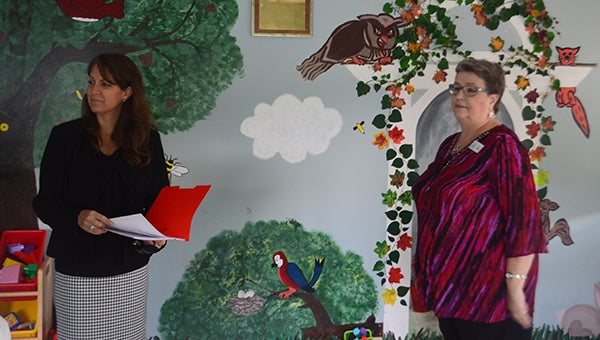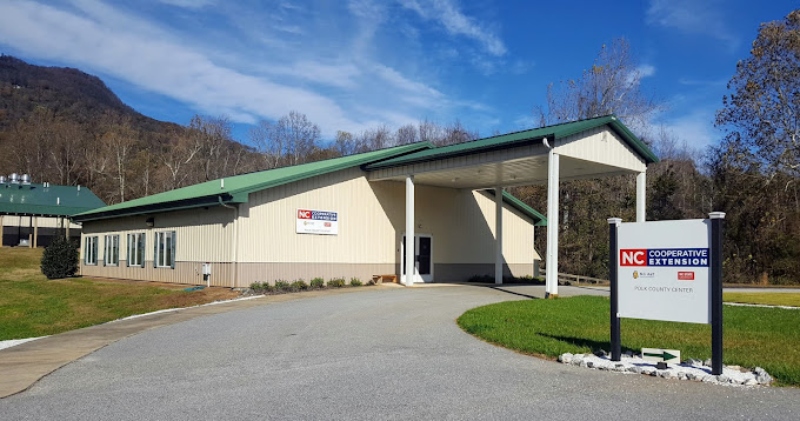Johnston tours Steps to HOPE
Published 10:00 pm Friday, June 24, 2016

Lee Lindsay, right, executive director of Steps to HOPE, welcomed Secretary Johnston to the domestic violence shelter for a tour and discussion Wednesday. Johnston toured Steps to HOPE as part of her initiative to visit domestic violence shelters across the state. Johnston said during her visit that one of her focuses is helping overcome the obstacles local domestic violence centers face ranging from financial to legal barriers. (Photos by Michael O’Hearn)
North Carolina Secretary of the Department of Administration Kathryn Johnston made a visit to the Columbus Steps to HOPE Wednesday afternoon to tour the facility.
Steps to HOPE Executive Director Lee Lindsay and her staff talked with Johnston to determine the needs and challenges facing the domestic violence shelter located next to the Polk County Sheriff’s Office.
The HOPE acronym, which stands for Help, Order, Protection and Encouragement, focuses on preventing domestic violence, sexual assault and elder abuse, according to Lindsay, and provides counseling and shelter for those in need through programs and shelter. One of these programs is the Domestic Abuse Intervention Program, according to Lindsay.
Trending
“The Council of Women administers all of the state grants we get. Through state grants, roughly seven grants were provided by the state for domestic violence and sexual assault,” Lindsay said. “We also offer a state mandated Domestic Abuse Intervention Program that is 26 weeks and the court will, before the person facing assault charges gets to trial, recommend taking our program here. At the end, a judge will say they either did or didn’t participate in the program properly.”
Secretary Johnston, along with her Public Information Officer Chris Mears, will be visiting domestic violence shelters throughout the state to assess their needs in order to bring status reports of these shelters back to Gov. Pat McCrory.
They have also scheduled trips to Safelight Mainstay in Hendersonville and a domestic violence shelter in Asheville as part of their tour of the western region of the state, according to Mears. Mears said he and Johnston would visit three shelters in each of the four regions of North Carolina this summer.
“There are a lot of similarities in the legal and basic needs that we’ve learned in these visits to the shelters,” Johnston said. “For example, transportation can be a struggle whether it is to get someone here at the shelter to a doctor’s appointment, work or even an interview when they start working towards a job. We’re going to keep finding the barriers that prevent domestic abuse shelters from getting the services they need.”
According to Lindsay, some of the biggest issues Steps to HOPE is currently facing range from financial assistance when it comes to finding an affordable attorney for a client to putting a client into affordable housing.
“Having a dedicated assistant district attorney and judge to hear family court type matters such as domestic violence cases, rape cases, child custody cases, child support and other things would go a long way to convicting some of the habitual offenders,” Lindsay said. “For a victim of domestic violence or rape to have to speak out in an open courtroom to describe what happened to them in front of a room full of people that may likely know who she is could lead to the victim being assaulted again and again.”
Trending
She mentioned Ashley Meadows, a Section 8 low-income affordable housing apartment complex in Columbus, but added even with Ashley Meadows nearby, affordable housing is still limited in the area.
“One of the leading reasons that a client may be with us for a longer period of time than need be is just getting them into a home that they can afford,” Lindsay said. “Many of our clients would prefer to be close to their extended family resources, but end up moving some distance away because they can’t find anything here.”
According to the Department of Administration website, Secretary Johnston was appointed by Gov. McCrory to serve as Secretary of the Department of Administration in March. She served as the acting secretary and also Deputy Secretary of Service Operations where she oversaw the Motor Fleet, Surplus Property, Mail Service Center, State Parking and the Purchase and Contract division.
A Greensboro, N.C. native, she received her undergraduate degree in economics and political science at the University of North Carolina at Greensboro and Master’s degree in public administration from NC State.
“When I took on the role of secretary three months ago, I knew a lot about the administration side of things but one of our goals is advocacy,” Johnston explained.
Mears added that making changes in the state legislature and tweaking bills before they become state law could be a viable solution.
“Secretary Johnston is supposed to meet with Gov. McCrory every Tuesday to report the status of these shelters across the state,” Mears explained. “I feel we need to push the legislature to help these local domestic violence centers.”
While serving as the deputy secretary, Johnston said she had not really been involved in the advocacy components of the Department of Administration since her role entailed a more “local government” mindset in the Service Operations division.
“I certainly felt very comfortable with the operations side, but wanted to get esteemed in the advocacy areas like the Council for Women,” Johnston said. “The main focus of these visits to the shelters across the state is to find the barriers that prevent women from getting the services they need.”
Lindsay said she wishes she knew how the state government could help a county as small as Polk.
“How do we get help from a statewide government for a county with a population of about 20,000 residents? Even the collective populations of Polk, Henderson and Transylvania counties at 160,000 residents is only 1.7 percent of the state population,” Lindsay said. “If someone would help me understand how to get the attention of those who could make a difference, I would gladly contact them for help.”
Steps to HOPE accepts endowments, bequests and donations to continue their mission of ending domestic violence and sexual abuse and providing shelter to victims. To learn more, contact Lindsay at 828-894-2340 or email steps@stepstohope.org.





